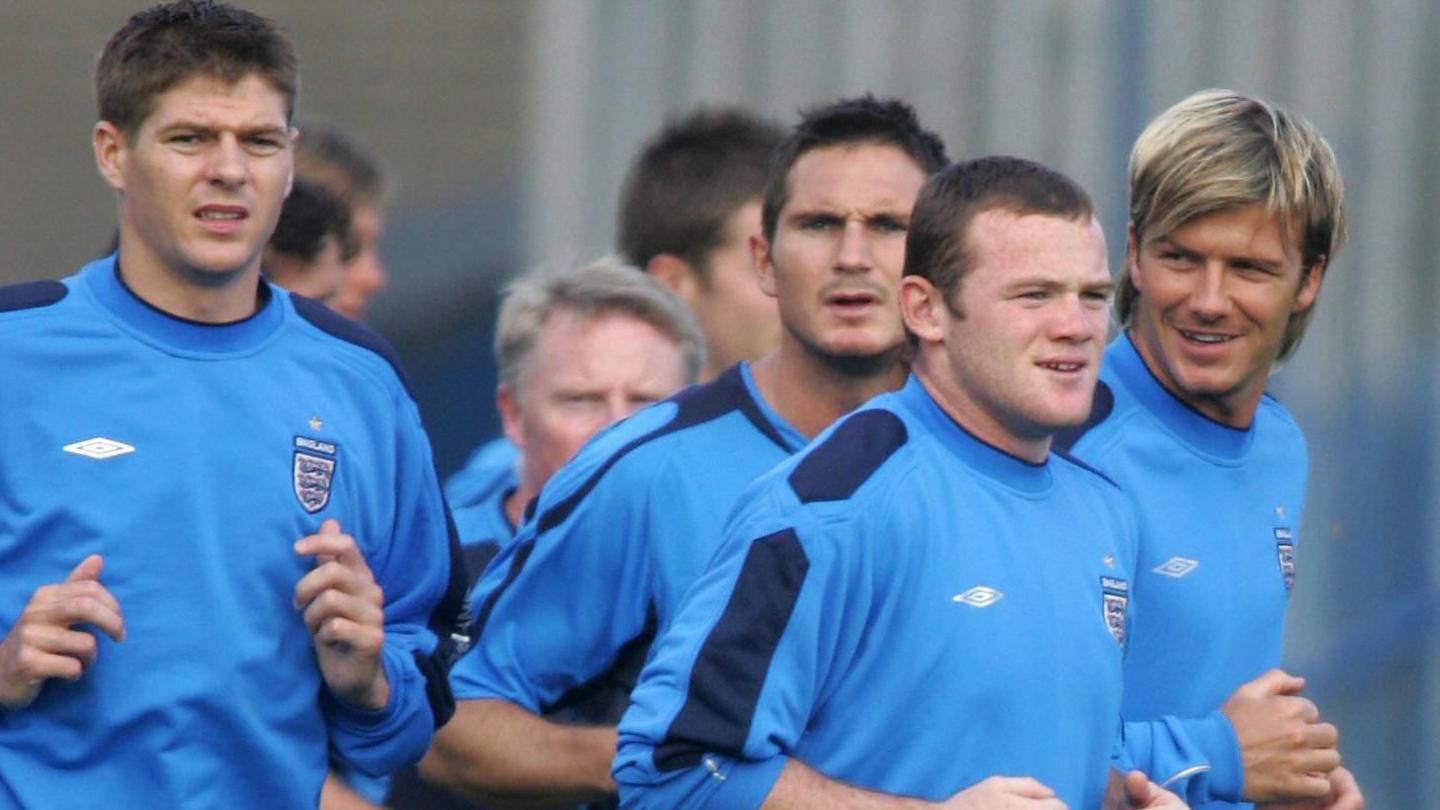- 339 Comments
Tactical shortcomings, misguided managers or stellar opponents are among the numerous reasons often cited why England’s so-called ‘Golden Generation’ failed to deliver success on the pitch.
Former captain Steven Gerrard’s recent observation that they were simply “egotistical losers” also plays into the club cliques argument that has come to the fore since many retired as players.
Squads boasting the likes of the Liverpool legend plus David Beckham, Frank Lampard, Paul Scholes, Wayne Rooney and Michael Owen reached three successive major quarter-finals between 2002-06 before failing to qualify for Euro 2008 and bowing out of the 2010 World Cup in the last 16 to Germany.
Surely they should have done better, is how the story goes, especially with defensive options like Gary Neville, Rio Ferdinand, Sol Campbell, John Terry and Ashley Cole that current boss Thomas Tuchel would surely be envious of.
‘We didn’t connect’ – club cliques
Club over country and the fiercely competitive Premier League rivalries between Manchester United, Chelsea, Liverpool and Arsenal often come up as a problem.
Speaking as a guest on the Rio Ferdinand Presents podcast 45-year-old Gerrard, who won 114 caps and played at six major tournaments without reaching a semi-final, said: “I think we were all egotistical losers.
“Why didn’t we connect when we were 20, 21, 22, 23? Was it ego? Was it rivalry?
“It was down to the culture within England. We weren’t friendly or connected. We weren’t a team. We never at any stage became a really good, strong team.”
That view has been shared by both Ferdinand and Lampard previously on TNT Sports.
“You feel so passionately about the club you play for with your team-mates, your own performances, that to be a bit pally with someone you’re competitive with… it may have [held back England],” Lampard said.
“We didn’t hate each other but by nature we would sit on different tables.”
The midfield mix, talent wasted and stellar opponents

Then FA chief executive Adam Crozier coined the term ‘Golden Generation’ following England’s 5-1 World Cup qualifying away win over Germany in 2001.
But at the 2002 World Cup it was the Germans who reached the final in Japan and England, who were without the injured Neville and Gerrard and with Beckham only “75%” fit, were knocked out in the last eight by Ronaldinho’s freak free-kick for eventual champions Brazil.
Still, during the early 2000s, England’s midfield – at least on paper – was as good as any around.
But were the system and tactics? Under Sven-Goran Eriksson (and later Steve McClaren and Fabio Capello) England stuck rigidly to a 4-4-2 formation with Beckham on the right.
Gerrard and Lampard, who struggled to dovetail, were paired centrally and Scholes, who the Swede regarded as his “most talented player,” was shunted left.
Speaking to Ferdinand, Gerrard said there should have been a way to deploy all three centrally, while Neville suggested pivoting to a 3-5-2 could have brought glory.
Realistically, would it have made a difference?
In addition to the mercurial Ronaldinho, Brazil’s star-studded squad featured Cafu, Ronaldo, Rivaldo, Roberto Carlos and Lucio to name but a few. France could call upon Zinedine Zidane, Patrick Vieira, Thierry Henry, Lilian Thuram and Robert Pires.
Meanwhile, Spain fielded Andres Iniesta, David Villa, Xavi, Fernando Torres, Xabi Alonso and Sergio Ramos.
So, while England had the luxury of great players, other leading nations did too.
“The elephant in the room is that, in those tournaments, there were other teams who were simply better than us,” said former goalkeeper David James on BBC Radio 5 Live.
James, who won 53 caps for England, added: “They can stop you from being your best and you can lose. If you want to blame egotistical players, you’re probably missing the real issue – which is that sometimes, other teams are simply better.
Injury woes, WAGS and whatever else

England’s preparations and performances at football’s blue riband competitions have always seemed to be hampered by injury problems to key personnel.
Former England and Manchester United captain Bryan Robson’s woes in 1986 and 1990 were highlighted as a major barrier to World Cup success by Sir Bobby Robson and Des Walker, and fitness concerns were often a thorny issue for the likes of Beckham, Owen, Rooney, Ferdinand and Gerrard.
The psychological pressure of penalty shootouts was highlighted by Portugal goalkeeper Ricardo when he talked of taking advantage of the fear in English eyes in 2006.
So was the culture and preparation all it could be?
Scholes has said he retired prematurely from international duty because he wished to avoid long stints away from his family, while England lurched from the circus of the WAG phenomenon in 2006 that Neville has since criticised, to the regimented and remote camp in Rustenburg in 2010 during Capello’s tenure that left Terry and Rooney complaining of boredom.
“Spending hours in hotels trying to entertain yourself was tough. That kind of isolation can wear on you,” added James.
“In 2010, we were in a beautiful hotel, but it was right in the middle of the training facility. We couldn’t escape football.
Related topics
- Football
- England Men’s Football Team
Source: BBC

Leave a Reply